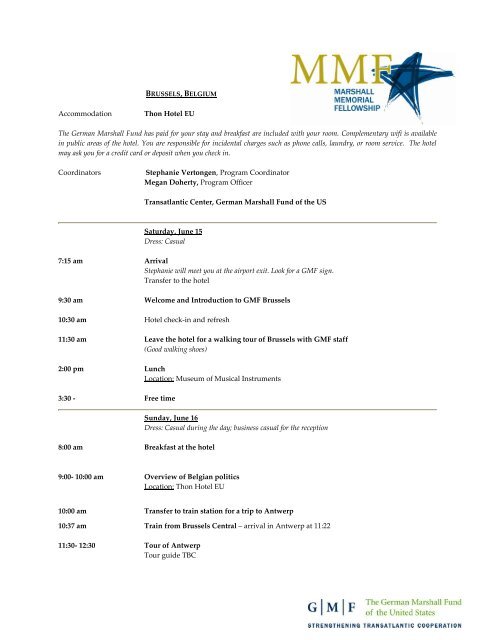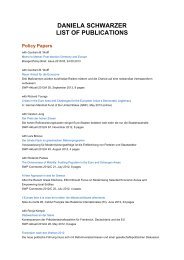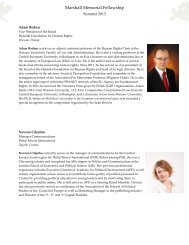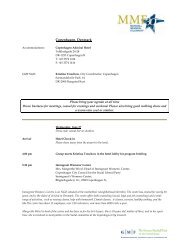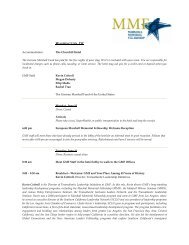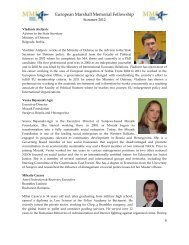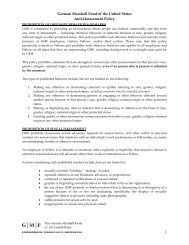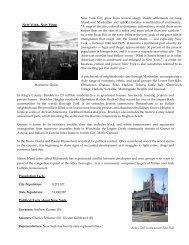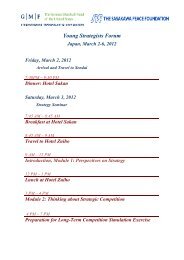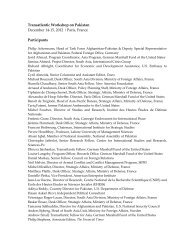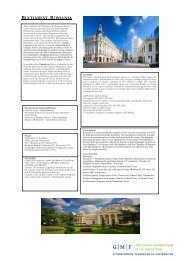Brussels (Belgium) - German Marshall Fund of the United States
Brussels (Belgium) - German Marshall Fund of the United States
Brussels (Belgium) - German Marshall Fund of the United States
Create successful ePaper yourself
Turn your PDF publications into a flip-book with our unique Google optimized e-Paper software.
BRUSSELS, BELGIUM<br />
Accommodation Thon Hotel EU<br />
The <strong>German</strong> <strong>Marshall</strong> <strong>Fund</strong> has paid for your stay and breakfast are included with your room. Complementary wifi is available<br />
in public areas <strong>of</strong> <strong>the</strong> hotel. You are responsible for incidental charges such as phone calls, laundry, or room service. The hotel<br />
may ask you for a credit card or deposit when you check in.<br />
Coordinators Stephanie Vertongen, Program Coordinator<br />
Megan Doherty, Program Officer<br />
Transatlantic Center, <strong>German</strong> <strong>Marshall</strong> <strong>Fund</strong> <strong>of</strong> <strong>the</strong> US<br />
Saturday, June 15<br />
Dress: Casual<br />
7:15 am Arrival<br />
Stephanie will meet you at <strong>the</strong> airport exit. Look for a GMF sign.<br />
Transfer to <strong>the</strong> hotel<br />
9:30 am Welcome and Introduction to GMF <strong>Brussels</strong><br />
10:30 am Hotel check-in and refresh<br />
11:30 am Leave <strong>the</strong> hotel for a walking tour <strong>of</strong> <strong>Brussels</strong> with GMF staff<br />
(Good walking shoes)<br />
2:00 pm Lunch<br />
Location: Museum <strong>of</strong> Musical Instruments<br />
3:30 - Free time<br />
8:00 am Breakfast at <strong>the</strong> hotel<br />
Sunday, June 16<br />
Dress: Casual during <strong>the</strong> day; business casual for <strong>the</strong> reception<br />
9:00- 10:00 am Overview <strong>of</strong> Belgian politics<br />
Location: Thon Hotel EU<br />
10:00 am Transfer to train station for a trip to Antwerp<br />
10:37 am Train from <strong>Brussels</strong> Central – arrival in Antwerp at 11:22<br />
11:30- 12:30 Tour <strong>of</strong> Antwerp<br />
Tour guide TBC
12:30- 2:00 pm Lunch<br />
Location: De Kaai<br />
2:30- 4:00 pm Transatlantic and European Trade: The importance <strong>of</strong> <strong>the</strong> Port <strong>of</strong> Antwerp for <strong>Belgium</strong><br />
Meeting at <strong>the</strong> Port <strong>of</strong> Antwerp<br />
4:30- 5:00 Transfer to train station<br />
5:08 Train back to <strong>Brussels</strong> Central<br />
7:00 pm Meet GMF staff at hotel lobby and transfer to reception<br />
7:30 pm Welcome Reception with local MMF<br />
Location: TBD<br />
PLEASE BRING YOUR PASSPORT!<br />
Monday, June 17<br />
Dress: Business attire<br />
8:20 am Meet GMF staff in hotel lobby for buses to NATO<br />
EU Thon Hotel<br />
9:00 am Arrival at NATO<br />
NATO is a political and military alliance created in <strong>the</strong> aftermath <strong>of</strong> <strong>the</strong> Second World War and at <strong>the</strong> beginning <strong>of</strong> <strong>the</strong> Cold<br />
War whose primary goals are <strong>the</strong> collective defense <strong>of</strong> its members and <strong>the</strong> maintenance <strong>of</strong> a democratic peace in <strong>the</strong> North<br />
Atlantic area. All 28 Allies have an equal say, <strong>the</strong> Alliance’s decisions must be unanimous and consensual, and its members<br />
must respect <strong>the</strong> basic values that underpin <strong>the</strong> Alliance, namely democracy, individual liberty and <strong>the</strong> rule <strong>of</strong> law. The Alliance<br />
is committed to protecting its members through political and military means. It promotes democratic values and is dedicated to<br />
<strong>the</strong> peaceful resolution <strong>of</strong> disputes. If diplomatic efforts fail, it has <strong>the</strong> military capability needed to undertake collective defense<br />
and crisis-management operations alone or in cooperation with partner countries and international organizations. The following<br />
countries are members <strong>of</strong> <strong>the</strong> Alliance: Albania, <strong>Belgium</strong>, Bulgaria, Canada, Croatia, <strong>the</strong> Czech Republic, Denmark, Estonia,<br />
France, <strong>German</strong>y, Greece, Hungary, Iceland, Italy, Latvia, Lithuania, Luxembourg, <strong>the</strong> Ne<strong>the</strong>rlands, Norway, Poland, Portugal,<br />
Romania, Slovakia, Slovenia, Spain, Turkey, <strong>the</strong> <strong>United</strong> Kingdom, and <strong>the</strong> <strong>United</strong> <strong>States</strong>.<br />
9:30- 10:30 am NATO: Its Transformation and New Strategic Concept<br />
Mr. Jonathan Parish, Senior Planning Officer& Speechwriter, Office <strong>of</strong> <strong>the</strong> Spokesperson,<br />
Public Diplomacy Division, NATO<br />
Jonathan Parish was educated at Sandbach School, and at university in Sheffield, Aix-en-Provence and Hamburg. He was<br />
commissioned into <strong>the</strong> British Army and trained as a helicopter pilot. His command tours at flight and squadron level were in<br />
<strong>German</strong>y and at regimental level in <strong>the</strong> UK. During his regimental command, operational commitments included deployments<br />
to Bosnia (twice) and Kosovo. He also trained at <strong>the</strong> Army Staff College, and his staff appointments included a tour as a Military<br />
Assistant at SHAPE, <strong>Belgium</strong>; Head <strong>of</strong> <strong>the</strong> concepts, doctrine, digitization and operational requirements team at <strong>the</strong> British<br />
Army Headquarters Land Command; and Chief <strong>of</strong> operational support at <strong>the</strong> NATO Joint Headquarters in Madrid. His final<br />
tour in <strong>the</strong> Army was in <strong>the</strong> International Military Staff at Headquarters NATO, where he was responsible for <strong>the</strong> military<br />
aspects <strong>of</strong> NATO Enlargement and Combating Terrorism. In September 2004 he took early retirement from <strong>the</strong> Army in order
to assume his current post as Senior Policy Planning Officer and Speechwriter to <strong>the</strong> NATO Secretary General. Parish is<br />
married to Laurence, who is French, and <strong>the</strong>y have 3 children.<br />
10:30- 10:45 Break<br />
10:45- 11:45 Irene Maria Plank, Deputy Director, Secretary General Private Office, NATO<br />
Irene Plank was born in 1961 in Frankfurt, <strong>German</strong>y, into a family <strong>of</strong> musicians. She studied law in Frankfurt and Berlin and<br />
worked as a lawyer and at <strong>the</strong> Federal Cartel Office in both cities. In 1989, she joined <strong>the</strong> Ministry <strong>of</strong> Foreign Affairs and has<br />
enjoyed her work <strong>the</strong>re ever since. Her postings have included <strong>the</strong> <strong>United</strong> <strong>States</strong>, <strong>the</strong> Democratic Republic <strong>of</strong> Congo, Morocco,<br />
Jordan and Lebanon. She first came to NATO as a member <strong>of</strong> <strong>the</strong> <strong>German</strong> delegation in 2009, Russia being <strong>the</strong> main part <strong>of</strong> her<br />
portfolio. Since 2012, she has worked in <strong>the</strong> Private Office <strong>of</strong> <strong>the</strong> Secretary General as Deputy Director with a portfolio that, once<br />
again, includes Russia, but also China and Japan and all matters <strong>of</strong> internal management. She has three children (20, 16 and 14)<br />
and likes to bike to work, read almost everything, and improve her Arabic language skills.<br />
12:00- 1:30 Lunch at NATO<br />
1:30- 2:30 Transfer from NATO to next meeting<br />
2:30- 3:30pm The Future <strong>of</strong> Carbon Markets<br />
Speakers TBC<br />
4:00- 5:30pm Immigration and Integration in <strong>Belgium</strong><br />
Location: GMF <strong>of</strong>fices<br />
Naim Charkaoui, Director, Minderhedenforum<br />
Marco Martiniello, Director, Center for Ethnic and Migration Studies (CEDEM)<br />
Moderator: Lode Draelants (MMF Director, International Committee)<br />
Naima Charkaoui has served as <strong>the</strong> director <strong>of</strong> <strong>the</strong> Minderhedenforum (Minority Forum) since 2001. Minderhedenforum is an<br />
advocacy organization that brings toge<strong>the</strong>r most grassroots organisations <strong>of</strong> minority groups (people from migrant backgrounds,<br />
refugees, and trailer dwellers) in Flanders and <strong>Brussels</strong> (<strong>Belgium</strong>). Its seventeen member associations regroup some 1,600 local<br />
organisations. Minderhedenforum works on issues such as education, employment, and discrimination, and is represented in<br />
several consultative bodies in <strong>the</strong>se domains. The Forum has a small staff <strong>of</strong> 25 people. As director, Charkaoui is <strong>the</strong> head <strong>of</strong> staff,<br />
as well as <strong>the</strong> representative and spokesman <strong>of</strong> <strong>the</strong> organization.<br />
Marco Martiniello is Research Director at <strong>the</strong> Belgian National <strong>Fund</strong> for Scientific Research (FRS-FNRS), as well as <strong>the</strong><br />
director <strong>of</strong> <strong>the</strong> Center for Ethnic and Migration Studies (CEDEM) at <strong>the</strong> University <strong>of</strong> Liège. He teaches Sociology and Politics<br />
at <strong>the</strong> University <strong>of</strong> Liège and at <strong>the</strong> College <strong>of</strong> Europe (Natolin, Poland). He was visiting scholar and a visiting pr<strong>of</strong>essor in<br />
different universities around <strong>the</strong> globe including Columbia University, University <strong>of</strong> Malmö (Sweden), Sciences Po Paris,<br />
University <strong>of</strong> Queensland (Brisbane, Australia), University <strong>of</strong> Kwazulu Natal (South Africa), and European University<br />
Institute (Italy). He is <strong>the</strong> author, editor or co-editor <strong>of</strong> numerous articles, reports and books on migration, ethnicity, racism,<br />
multiculturalism and citizenship in <strong>the</strong> European Union and in <strong>Belgium</strong> with a transatlantic comparative perspective. His most<br />
recent publications include “La Démocratie Multiculturelle” (Presses de Sc Po, 2011), and “An Introduction to International<br />
Migration Studie,” European Perspectives (Amsterdam, Amsterdam University Press, 2012) (with Jan Rath).<br />
Lode Draelants (MMF 2011) currently works as Director at <strong>the</strong> International Committee in <strong>Brussels</strong> and Flanders. The<br />
International Committee (IC) is a civil society organisation; a democratic, multi-ethnic and multi-cultural federation <strong>of</strong> 265<br />
immigrants' organizations. By uniting immigrants' organizations <strong>the</strong> IC aims at <strong>the</strong> enhancing <strong>of</strong> leadership, social<br />
participation, emancipation and community building <strong>of</strong> immigrants and ethnic –cultural minorities. As a federation, IC focusses<br />
on education, employment and political and cultural integration.
5:30 – your dinner Return to <strong>the</strong> hotel for a refresh<br />
PLEASE BRING YOUR PASSPORT!<br />
Host dinners with local MMF<br />
Tuesday, June 18<br />
Dress: Business attire<br />
Breakfast at <strong>the</strong> hotel<br />
9:00 am Meet in <strong>the</strong> hotel lobby<br />
9:30 am Briefing: EU history and challenges<br />
By John Richardson, Senior Transatlantic Fellow, GMF<br />
GMF <strong>Brussels</strong> Office<br />
John Richardson joined GMF in 2008. Previously, he was an economist with Unilever for four years, before joining <strong>the</strong><br />
European Commission in 1973. From 1978 to 1996, he occupied various posts, including EU negotiator for trade in services<br />
during <strong>the</strong> Uruguay Round, and Unit Head, first for relations with <strong>the</strong> U.S., and <strong>the</strong>n for relations with Japan. In October 1996,<br />
Richardson became <strong>the</strong> deputy head <strong>of</strong> <strong>the</strong> Commission’s delegation to <strong>the</strong> U.S. in Washington DC, and in May 2001, <strong>the</strong> head <strong>of</strong><br />
delegation to <strong>the</strong> UN in New York. From 2005 to 2008, he headed <strong>the</strong> task force which developed <strong>the</strong> integrated maritime policy<br />
for <strong>the</strong> EU, adopted by <strong>the</strong> European Council in December 2007. Richardson is chairman <strong>of</strong> <strong>the</strong> ESPO award committee, a<br />
member <strong>of</strong> <strong>the</strong> board <strong>of</strong> trustees <strong>of</strong> Sail Training International, and a member <strong>of</strong> <strong>the</strong> board <strong>of</strong> <strong>the</strong> Salzburg Global Seminar. He<br />
also provides consultancy services through FIPRA.<br />
10:30- 11:00 am Walk to European Parliament<br />
Security Check-in<br />
11:30 am- 1:00 pm Introduction to <strong>the</strong> European Parliament<br />
Mr. Marcus Scheuren, Administrator, European Parliament, Economic and Monetary<br />
Affairs Committee (ECON) – Secretariat (MMF 2012)<br />
The European Parliament is <strong>the</strong> only directly-elected EU body and one <strong>of</strong> <strong>the</strong> largest democratic assemblies in <strong>the</strong> world. Its<br />
754 Members are <strong>the</strong>re to represent <strong>the</strong> EU's 500 million citizens. They are elected once every five years by voters from<br />
across <strong>the</strong> 27 Member <strong>States</strong>. Founded in 1952 as <strong>the</strong> Common Assembly <strong>of</strong> <strong>the</strong> European Coal and Steel Community<br />
(ECSC) and renamed <strong>the</strong> European Parliamentary Assembly in 1958, it became <strong>the</strong> European Parliament in 1962. The first<br />
direct elections took place in 1979. The current MEPs were elected during <strong>the</strong> 2009 elections and will serve until 2014. The<br />
evolution <strong>of</strong> <strong>the</strong> Parliament is closely linked to a succession <strong>of</strong> treaties culminating in <strong>the</strong> current Lisbon Treaty. These<br />
treaties define <strong>the</strong> rules and scope <strong>of</strong> <strong>the</strong> Union and have turned <strong>the</strong> ECSC <strong>of</strong> old into what is now known as <strong>the</strong> European<br />
Union. Over <strong>the</strong> years, milestones like <strong>the</strong> introduction <strong>of</strong> <strong>the</strong> euro and European enlargement have left <strong>the</strong>ir mark on <strong>the</strong><br />
European Parliament, its powers and its composition. The European Parliament has three main roles: i) debating and<br />
passing European laws with <strong>the</strong> Council; ii) scrutinizing o<strong>the</strong>r EU institutions, particularly <strong>the</strong> Commission, to make sure<br />
<strong>the</strong>y are working democratically; iii) debating and adopting <strong>the</strong> EU's budget with <strong>the</strong> Council.<br />
1:00 – 5:00 pm Individual appointments
7:00 pm Meet in <strong>the</strong> hotel lobby<br />
7:30 pm Closing Dinner<br />
Dinner venue TBD<br />
Wednesday, June 19<br />
Departures<br />
Please consult your flight manifests and share taxis to <strong>the</strong> airport where possible.


